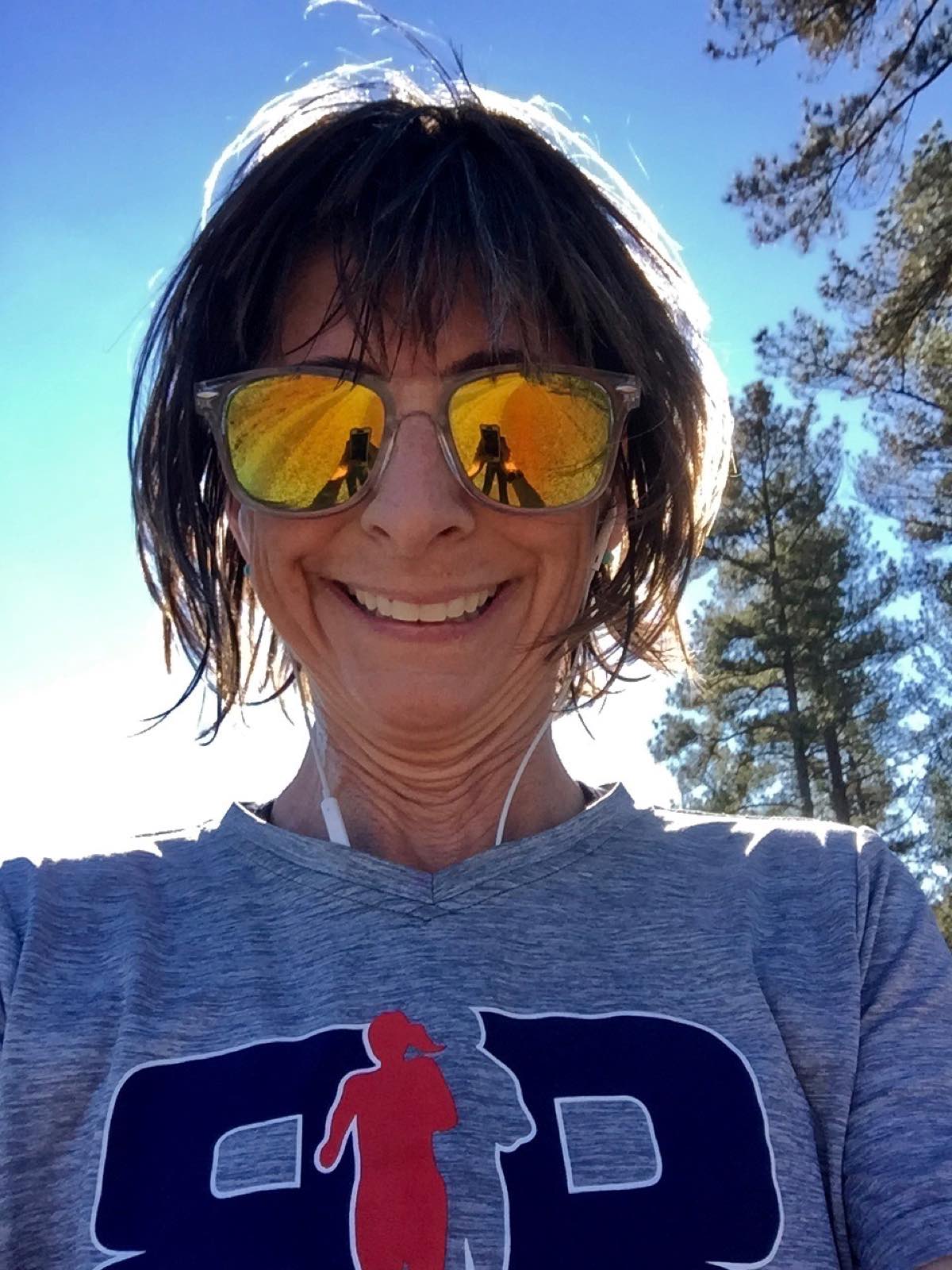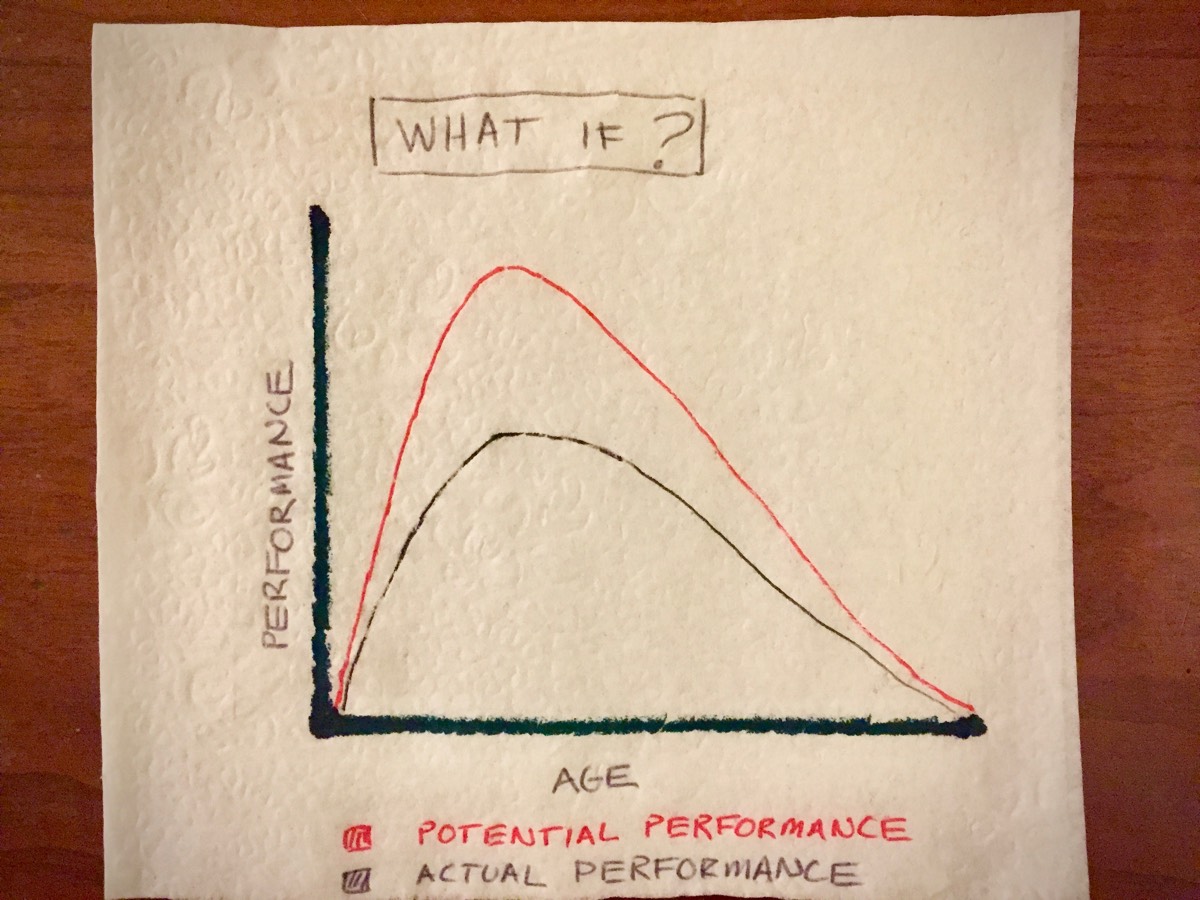Public Notice: This is the first in a 12-part series about excellent middle-aged runners. If you’re in your twenties or thirties, but you want to run and race well when you’re not, you should keep reading. If you want to better understand how to get the most out of what running offers, you should also keep reading. And if you’ve ever used the words “chugging along” to describe the 45-plus crowd, prepare to have your ideas about your body’s potential blown.
I’m a 47-year-old runner who’s looking to PR in the marathon and the 100 miler.
That’d be a sub-2:54 and a sub-15:07.
Possible? I think so.
“But why do you think it’s possible for you to get faster?” That’s what my friend, Pam Smith, asked me back in January. She was staying at my house after the Bandera 100k, and I’d sprung a five-year plan of my running goals on her at breakfast. Why did I think I was going to get faster as I waded deeper into middle age? She was interested, not dismissive or critical.
“I don’t know. I just do.”
She looked unimpressed. I poured us both more coffee. But that was all I had for her: a gut feeling.
I didn’t have any detailed training logs to support my belief. And I do understand that most middle-aged runners aren’t getting faster as they move toward 65 years old. I know all about the fun physical changes that happen to a runner’s body as it ages. And I’ve read the slew of recent articles and reports about ultrarunners who are making peace with the limitations of their older bodies.
But calculating probabilities has never been my strong suit. And not paying careful attention to what is probable has always served me well in running. I’ve won races and run well blissfully ignorant that I should set my sights lower. So after Pam helped me refine my racing plan, I continued training with my eyes set on PRing first in the marathon and then in 100 miles. Along the way, I wanted to qualify for the U.S. 100k team again.
Then in April, this happened in my training log.
Workout Notes: What a rotten 20 miler! I felt like dog poop on the bottom of somebody’s shoe. Ugggggh.
Coach’s Comment: You should consider that you’re perimenopausal. Running is often affected negatively before you hit menopause. (That’s the gist of the comment. My memory of the exact words are blurred by emotion.)
Perimenopausal?!?!!!
For the record, my coach is categorically wonderful, and this article won’t be about how fraught it is for a young coach to dutifully tell a 47-year-old woman that her running might be affected by perimenopause.
But, the thing is, while I meet the age requirements for perimenopause (I looked it up), it was also the first really hot day we’d had that year, so my crappy run might just have been crappy because I wasn’t acclimatized to the heat. Or it might have been just a random crappy run–and not crappy because I was circling a menopausal drain.
Sheesh!
I called my husband Eliot at work. “Hi, it’s your perimenopausal wife. Do you have five minutes to talk?” He navigated the landmines I set before him admirably.
Then I texted three good girlfriends. “Yeah, periMENOPAUSAL!”
I never thought I carried around much baggage about becoming an older woman, but, it turns out, of course I do. Once I was done text-venting and being soothed by unconditional support, I finally began to flesh out my thoughts about aging and running.
I know my body is aging. My hair is turning gray. The skin above my upper lip is wrinkling like an old woman on the Simpsons. And I have loose neck skin. I never noticed my neck skin before I turned 45. But when I put moisturizer on my face now, I think, Don’t forget that neck skin! The skin over my thighs is also looser. My hands look like my mother’s–which I like. Clearly, if all this is happening on the outside, things are changing on the inside too.
But two things:
- I don’t think I’ve reached my potential as a runner. Sure, I don’t have as much potential as I used to, but even with less potential at age 47, I still think there’s potential there. Of course, if you’ve run marathons professionally in your twenties and thirties, you’re not going to get any faster in middle age. You did reach your potential for that distance–or came pretty darn close. But a lot of us have never gotten anywhere close to running as fast as our bodies are capable of. And, as far as ultrarunning goes, we don’t have enough data to even say what a person’s potential is in middle age.
- More importantly, it’s not useful for me to scrutinize the impact my age has on my running performances. It’s not motivating. In fact, it’s wildly demotivating. Some people might think: Watch what a 47-year-old body can do! Not me. If I thought about it, I’d think: I’m 47, so I’m not likely to do as well as I did when I was 46; I shouldn’t try as hard. And, honestly, that’s only a few steps away from: I should just stay home and eat donuts.
I talked my ideas over with my coach. (Let us never speak of my neck skin again!) And then I talked about aging and potential with my middle-aged running friends. I talked about it with the middle-aged runners I coach. We all wondered what other middle-aged runners who are still competing for overall wins and podium spots think about their bodies’ abilities and potential as they get older. We wondered about middle-aged runners whose performances continue to improve as they age. We wondered about older runners who are simply strong, healthy, uninjured, and running well. How are they all training? What are they all thinking? What can we learn from them? (Are there secret elixirs?)
This new article series, which we start today and which we lovingly call ‘Age-Old Runners,’ originates out of my desire to learn more. So, going forward, each month we’ll interview other middle-aged runners to see what their experiences with aging are, how they see their potential, and how they’re going about achieving it. We’ve started a list of runners to interview, but I’d like to know who you think I should talk to and what questions I should ask. Which middle-aged athletes do you admire? Whose training secrets would you like to know? Who’s achieved enlightenment? Whose story should be told? Also, I need help with my interview request wording. “Hi, I noticed your neck skin is loose…”
See you here every month for the next year as we explore these stories and more.
Call for Comments (from Meghan)
Alright, here we go! Who should Liza interview in the next year? And what do you want to know from the successful middle-aged runners she speaks with?


